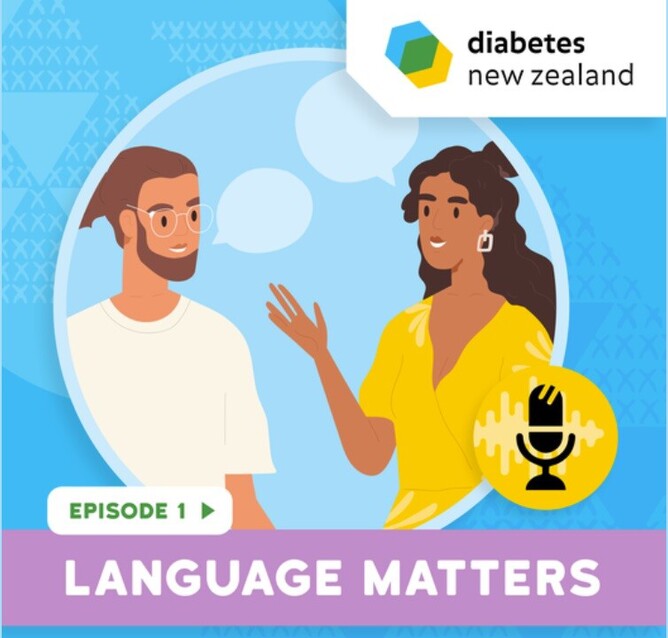This significance of this topic is increasingly being recognised in health, how does language impact people as far as their health, wellbeing and experience of the world? We are seeing the debates in nutrition, education and health about how the communication experience can lead to improvements, or be to the detriment of people's health. This is an excellent episode of Diabetes New Zealand's (DNZ) video/podcast series talking about the types of language we use and how it can have an effect on the wellbeing of people with diabetes (or any condition) and their whanau. Stress and anxiety are given as just one example of something that can be caused or made worse by language, and that can have a direct impact on actual level of blood sugar. Rosemary Hall (endocrinologist), Ruby McGill (advocate for type 1 diabetes) and Megan Whelan (RNZ media) bring their experience to the discussion. There are other episodes in the series, Nutrition matters, movement matters and prevention matters.
ResearchTeamAdvocacyHistoryDCSS auditCommunityConferenceHealth promotionPostersType 2 diabetesBoardHealthy eatingIn the NewsGardens4healthNZSSD2024PublicationResourcesEducationPrimary careHealth educationLifestyle ProgrammeNew medicationSummitDPTPreventionSchoolsCMDHBNutritionG4HGardeningGetwize2healthPHARMACCollaborationEquityInequityAnnual Activity ReportEthnic disparitiesLets Beat DiabetesType 1 diabetesYouth2023Health & WellnessBrandingDataGDMMedicationPresentationStaffCGMCommunity gardenDcssDisparityKidney diseaseMaoriNZ Nutrition FoundationNZNFProgrammeTe Tiriti O WaitangiThe Treaty of Waitangi2025Bariatric projectEventHealthy environmentPublic healthSouth Auckland2022CMHInequalilitiesNurse PractitionerOtaraThank youWorkplaces2016AccessCook'n KiwiCovid-19ExerciseGestational DiabetesLBDPhDQualitativeQuality AuditWDDWORTH study2021AdolescentArticleBarriersCampaignEpidemiologyMedicationsMiddlemoreMyLifeMattersObesityPartnershipPatient perspectivePregnancyRenalReportThrowbackWhakataukiWorld Diabetes Day20052011201320142015Bariatric SurgeryCelebrationCongratulationsCookingDiabetes NZEvaluationFIZZJust CookKaumatuaNutrition FoundationNZMJOutcomesPacifikaPhysical activityPilotPrecision medicinePVAQuality improvementSocioeconomic disparitiesSportsSugarTrain the TrainerTrulicityVision200620082009201020182019AbstractAdolescentsAged careAuckland CouncilAuditCardiovascular diseaseChristmasDebateDiabetes In PregnancyDiabetes resourcesEnvironmentGW2HIDFInformation sheetsInsulinMaraeMasterClassMedical directorMITMortalityMy Life MattersOffice hoursPatient Voice AotearoaPolicyPre-DiabetesProfessional developmentRecruitmentSADPSafetySouth Auckland Diabetes ProjectTe ReoThe renew roomVegetablesWebsitesWhitiora20072012201721 yearsAimAucklandAustraliaAwarenessBlood pressureBreast feedingComplicationsContinuous Glucose MonitoringCounties ManukauDiabetes preventionDulaglutideEthicsFairnessFundraisingGoutGovernanceGPHealthy AgingHeart failureHolidayIGTImpaired Glucose ToleranceKate SmallmanMotivationMulti-ethnicOlder personOrganicPacifickaPerformancePetitionPlanningPlant BasedPodcastRegistryResilienceRiskRole modelScreeningShop for your lifeSpecial KStrategySugar taxSugarbustersSurveyTalanoa approachTe Whatu OraTikanga MāoriTrust DeedValuesVegetarianVideoVLCD19961998200020012002200320042020AbsenteeismActivatorsAdult nutritionAdvisorANZMOSSAtrial FibrillationBeneficiaryBequestBMC MedicineBudgetCanadaCancerCapacity buildingCCRepChild healthCholesterolCity MissionClimate actionClimate changeCo-designComicConsultationContinuous Glucose MonotiringDementiaDeterminants of healthDiabetesDiabetes EducatorDietitianDifferent DinnersDining outDirectoryDiversityDonationDoor-To-Door studyDry weather gardeningEATucationEnablersESRDEvluationExcellence awardEye ScreeningFAQsFast foodFood literacyFood povertyFood sovereigntyFootcareFree trainingGLP1 receptor agonistGreen Lip MusselsGuidanceHATHealthy Auckland TogetherHealthy psychologyHealthy TuckshopsHigh-risk populationHOPE programmeHua parakoreHyperglycaemiaIFGIn printInnovationInsulin pumpsIronmanJAHAJardianceJournalJournal of American Heart AssociationKidney SocietyLanguageMāoriMāraMātanga TapuhiMedirayMisinformationNewletterNGONoMoreFearNurse ledNurse PrescriberNutritionistNZ Health SurveyNZOTYOlder agegroupOpening hoursOverweightPassport studyPānuiPhotographsPost covidPresenteeismProvidersPumpsRandomised control trialRangatahiRCTRecipeRheumatic Heart DiseaseRichard cooperRoadshowRocketsparkRotarySatisfactionScabiesScience festSGLT2 InhibitorSponsorsStakeholdersStandardsStocktakeStudent nurseSummerSupport GroupsSustainableTamaki MakaurauTechnologyTika TunuTongaTravelTriathlonUpdateWater conservationWomenWork experienceWorkplace exerciseWorld Health Organisation
TAGS
Language matters when talking about diabetes - DNZ Podcast
November 30, 2022


